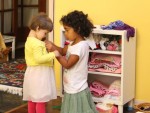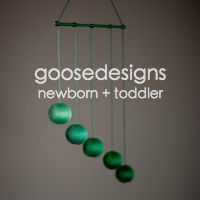Toddler Discipline: How Do I Get My Child To Clean Up and Do What I Ask?
One evening, B and M (3 years, 1 month) decided to take everything off their kitchen shelf and put it into their backpacks. Plates, bowls and utensils jangled around loudly in their backpack as they hauled it around the house. When I announced storytime, they dropped everything in the hallway. Daddy stopped them and said, “You guys need to put everything away!” Mackenzie does as she’s told, with some help from me. Brooke, ever the rebellious one, refused.
Mark is an amazing dad, but – like all of us – sometimes he doesn’t know what to do when the children don’t do what he asks. He asked first in a firm and respectful tone. Then he gave Brooke choices, “Do you want to go by yourself or do you want me to carry you?” She avoids looking at him, so he chooses for her and carries her to the kitchen. They stand in front of the kitchen shelf for a good five minutes where she still refuses to put things away, so he decides to give her ‘time-out’ on the couch. She somehow falls off the couch and starts screaming.
It was clear this classic power struggle was going nowhere, so Mark handed her off to me (teamwork, people). I first asked where she hurt herself. She pointed to her head, so I sat and held her quietly for a couple minutes till she stopped crying. Even if she fell trying to get out of time-out, she still needed empathy first. (See Connection Before Correction)
Then I looked her in the eyes and told her the facts, “I’m going to read stories now. You can join us after you put away your dishes and utensils.” I added, “You don’t have to put anything away if you don’t want to, but then you won’t be able to read books with us tonight.” I wanted to convey this was her choice. I put her down and went back to the bedroom. I sat down next to M and started reading. B got into bed with us and tried to pull the book toward her so she can see it. I held the book close to my chest and said in a friendly tone, “You can join us for this story after you put away your dishes and utensils.” She doesn’t move. She tried to pull the book toward her a couple more times, but each time, I tell her the same thing. My tone was friendly, but my stance was firm.
Finally, Mark came to ask her again. This time she got up, went to the kitchen and put everything away, with some of his help (see Collaborating With Your Child). When she was done, she ran back to the bedroom and joined us for story time.
This kind of scenario happens in our house frequently and it illustrates a few key things around disciplining young children:
1. Understand your child’s developmental age
In this post, I talk about Montessori’s Three Stages of Obedience. Up to 3 years old, children are too young to be expected to obey. They have an inner directive that guides them, and their obedience is to that inner voice only. If they obeyed your request, it’s because it coincided with what they wanted to do. When it comes to cleaning up – if they are not readily willing – you can ask them to help, then hold their hand and model doing it with them by your side.
Recently, my children have transitioned to the 2nd stage of obedience, where they want to obey, but can’t do it consistently. How do I know this? I’ve observed them doing what I ask more frequently, but still inconsistently. If you’ve notice your child being able to obey your requests more frequently, then you can make more requests, while continuing to offer collaboration. It is appropriate at this stage to provide logical consequences if they don’t do as you ask.
2. Provide logical consequences
Here are few things that are NOT logical consequences:
- Taking away favorite toys that are unrelated to the situation
- Withholding sweets, trips to the zoo or anything that will happen tomorrow or a later time
- Time-outs and other arbitrary punishments. What does sitting in the corner have to do with cleaning up? Nothing.
A logical consequence is something that is directly related to what is happening. For us, we clean up before storytime, so it is sequentially logical: if you don’t clean up, you can’t join story time. If you throw a fork on the floor or leave the table, it means you are done eating. If you don’t get dressed, it means you can’t go out to play. These are logical consequences that make sense in the context of what is happening.
3. Don’t take it personally
If you understand the 3 Stages of Obedience, you will see that it is not personal. It is developmental. Your child is not being defiant on purpose, trying to make you angry, or being a bad kid. And you are not a bad parent! Their brain just hasn’t developed all the linkages it needs to follow your requests.
Last words of advice: Choose your battles. Don’t insist on everything. When they get to 5, they will obey your requests much more readily. If you don’t get embroiled in power struggles with your toddler, you’ll enjoy the magic of 2s and 3s so much more!











I have run into the same problem with one of my twins who will be 4 in December. She always wants to do her own thing, never wants to clean up, and seems to enjoy battling about everything. The other night, she wouldn’t put her pajamas on – she kept playing in the hallway, running into other people’s rooms, and overall not doing what we do EVERY NIGHT! After almost 10 minutes I told her that she had 2 more minutes until I started reading stories and she needed pajamas on if she was going to hear them. She said ok, but didn’t stop playing around, so I started reading to her twin sister who was ready. This made my playing around twin go crazy! She came running into the room, screaming and tantruming about how she didn’t want to miss the story, wait for her, start it over, etc. Keep in mind, this is a story they have heard at least 2 dozen times before, so it’s not like she was really missing anything. I told her to hurry and get her pajamas on so she could join us, but she wouldn’t leave the room and kept screaming, to the point where I couldn’t even hear myself reading. So my husband came in and took her (kicking and screaming) to her room to help her, but she didn’t want any help (typical). She ended up missing the entire story (which was about 10 minutes long) because she was freaking out so much.
This is typical behavior for her, and it is exhausting. We offer to help, we give her small choices, we remind her of consequences, but she regularly doesn’t comply. Some days she doesn’t want to buckle her seat belt, so we sit in the car (if we’re not running late to an appointment) for 10 or 15 minutes until she’s done acting up and can buckle. She’s reminded that she’s missing playtime, but it just doesn’t seem to make an impact. I really feel like she’s “that kid” that the teachers and coaches (swim and gymnastics) dread to see arrive, because she acts this way for everyone. As her mom, I hate that she misses out on things – she had to miss the last 10 minutes of gymnastics last weekend because she couldn’t stay with her group. She’s been sat out of her circle at preschool when she is disruptive and at the open house where the kids show the parents what they do with some of the Montessori materials, she couldn’t find most of them because she hadn’t been a part of things when the teachers reviewed everything earlier in the day. She’s been taken out of the pool during swim lessons because she doesn’t follow directions like keeping her head above water to listen to the coach.
I want to help her, but I feel at a loss. I’ve asked her teacher if we should be looking into something (ADHD? Something else?), but they don’t seem to think so. Can you offer any advice for my emotional, dramatic girl??
What does she like to do? I mean, what is something she can do for hours. My advice is you must help her find her work. A solitary piece of work that requires precision, concentration, is done with the hands, preferably something that helps take care of herself or the environment. It depends on what she likes to do and what she’s interested in. It can’t be something that an adult has to help her with, it must be something that she can concentrate and do by herself. Preferably something repetitive, like washing dishes, mopping the floor, sweeping, cleaning the table, vacuuming, etc. My Brooke is totally like what you’re describing, but whenever she is able to settle down and concentrate on something, her whole demeanor changes for days.
Abby, I also want to add that with a child like this, you really need an immense amount of patience. I know. I’m living it. I feel like the more I punish or I’m stern, the less effective. But the more I help her out when she clearly need help, the easier she is. For example buckling up in the car or helping to get dressed. I think children when they get like this, they are so riled up, they just can’t settle back down easily to do things that they normally can do. That’s why finding her work is critical, something that brings the concentration back to her body and mind…
Just read this article for the second time and want to say that how lucky of the twin to have you and mark as a parents. The parents that understand and work together to guild the children.
Thank you so much… I have had many of these power struggles with my 2 year old and been at a complete and utter loss on how to handle it. Some days it has caused me to lose my patience, which I really don’t like. Your post has given me info and tips that will surely help 🙂
Thank you so much for this. My wife and I have been at a loss as to how to handle our one twin 3 year old son. This helped tremendously.
Yep. So right again. I found if I just avoided the power struggle with the twin that is resisting, (at age 2 anyway) they would come back to it in a few minutes and be ready to do it. I called it the round-about way to get them to cooperate. In America we have such a love of logical, linear ways — with toddlers, the roundabout way is much more effective. No punishment — just coming back to it and the “privileges” were waiting for them when they were finished. At age 4.5, we ask only once. 90% of the time they do it. As a result, I have never had to waste my time cleaning up their playroom at the end of the day.
This is so helpful, thank you! I have an almost three year old and naturally gravitated toward respectful-style parenting, but don’t really have a method I follow and am looking for direction and guidance . This type of approach is exactly what I’m looking for! One question — how would you handle the situation if there was not story time coming up? That’s where I’m not sure what to do. Thank you!